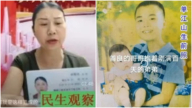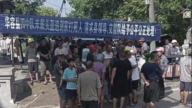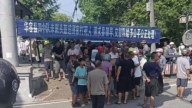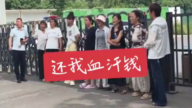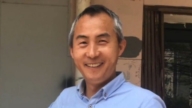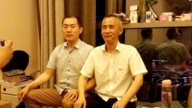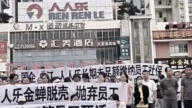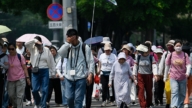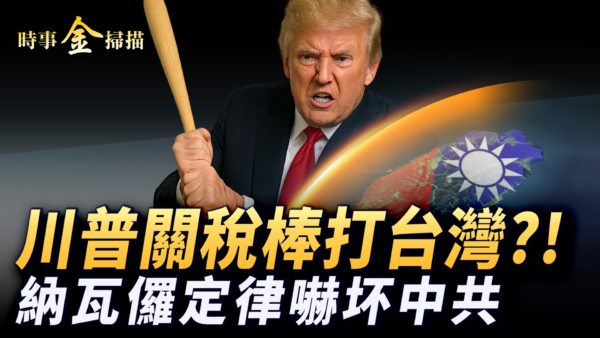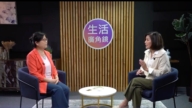【新唐人2011年7月9日讯】中国大陆作家韩寒、李承鹏、慕容雪村等10位畅销作家和出版人,最近又在北京发起倡议成立“作家维权联盟”,专门为作家免费进行“反盗版”维权诉讼。但是,有分析认为,中共当局不会让一个民间的非官方的维权机构做大做强的。
继“3•15”50位作家、出版人联名声讨“百度”没有结果之后,大陆作家又有了新的动态。7月4号,“作家维权联盟”在北京宣告成立。倡议人为韩寒、李承鹏等5位作家,和路金波、沈浩波等5位出版商。
《浙江日报》报导,沈浩波和李承鹏表示,他们一直期待当局管理部门,能针对“百度文库”对作家们的侵权行为,作出公开表态或行政处罚,但一直没有着落,这让他们觉得,只有靠自己的力量才能获得公平的对待。
作家李承鹏将这次的维权行动形容为:“好比村里来了小偷,村民报警却没人管,只好成立自卫队。”
报导引述北京“磨铁图书”总经理沈浩波的话说,联盟是独立的非营利协力厂商组织,目前已经获得30多位作家授权,并会展开一系列打击网路盗版的维权行动。
“作家维权联盟”如何维权?贝志诚介绍说,基本运作方式是在一定时间内,集中目标发起法律行动,例如第一期是针对“百度”和外资“苹果公司”。联盟将承担一切法律诉讼成本。维权收益则是作家与联盟八二分成。
不过大陆作家群里知道这个消息后,都持观望态度。文学评论家、出版人夏烈说,“毕竟现在参加联盟的作家太少了,作家们只有在联盟打赢几场官司、看到实际效果后,才会有所选择。”
目前在德国工作访问的中国作家周勍也表示,由于“作家维权联盟”是非政府性质,他认为,这次中国作家维权成功的概率不高。
周勍:“这个作家联盟是个自发组织。而且基本上都是所谓非主流作家。政府害怕这些人通过这样一个联盟,构成将来和官方的作家协会或作家协会下面的作家权益委员会,进行对抗的一个机构。在中国,任何一个非政府组织都是被严密监控和打压的对像。正因为这样我认为它们成功的概率很小。”
周勍表示,虽然这次作家维权的对像还包括了外资“苹果公司”,但官方不会因为“爱国主义”而转变态度。
周勍:“官方不会因为说是哪一个渺茫的看不见的所谓’爱国’情绪﹔而让一个政府不喜欢的民间组织做大。”
6月初,中国关闭了55家所谓的“非法网路公关网站”,其中涉及维权的网站多达20家。互联网维权人士表示,当局可能借此,打压他们所认为的“揭露社会阴暗面”的网站。
此外,中共高层一再高调“反腐”,但由民间自发创建的反腐网站“我行贿了”曾经火爆一时,却在两周后如昙花一现,在6月底匆匆谢幕。当局的理由是“这种形式不合法”。
新唐人记者李静、郭敬综合报导。
Writers Rights Protection
Ten famous Chinese writers and publishers, including Han Han,
Li Chengpeng, and Murong Xuecun, recently proposed
a “Union of Writers for Rights Protection" in Beijing,
helping writers with anti-piracy lawsuits for free.
However, some analysts believe that,
the Chinese Communist Party (CCP) will not allow
an unofficial rights protection organization to exist.
After 50 writers and publishers condemned Baidu to no avail,
on March 15, Chinese writers recently took a new direction.
On July 4, the “Union of Writers for Rights Protection"
was established in Beijing, by 10 writers and publishers,
including Han Han, Li Chengpeng, Lu Jinbo and Shen Haobo.
According to Zhejiang Daily, Shen Haobo and Li Chengpeng
said that they expected government officials to do something
about Baidu Library’s infringement of writers’ copyrights,
including penalizing the website. However, nothing happened.
They then realized that only through their own efforts,
will they be able to seek justice.
Li Chengpeng, a writer, described these rights protection efforts
as: “Thieves came to the village. Villagers reported it to police,
but no one did anything about it, so villagers formed a militia."
The report cited Shen Haobo’s, general manager of Beijing’s
“Motie Books," saying, “This union is a nonprofit organization
cooperating with publishers. It is sanctioned by over 30 writers,
and will carry out rights protection actions against online piracy."
When Bei Zhicheng was asked to explain how
the “Union of Writers for Rights Protection" works, he said,
“The working model is aimed at taking judicial actions
for a certain period of time while focusing on several
copyright violators, like Baidu and Apple in the first session.
The union will bear all the litigation costs.
The rights protection revenue will be split 80% and 20%
in favor of the writers and the union, respectively.
But many Chinese writers are taking a “wait-and-see" attitude.
Xia Lie, a literary critic and publisher, said,
“Only when writers see concrete results, will they take actions."
Zhou Qing, a Chinese writer now visiting Germany, said,
“Since the “Union of Writers for Rights Protection" is
an unofficial organization,
these writers don’t have much of a chance to win."
Zhou Qing said: “This writers’ union is a self-proclaimed
organization comprised mostly of non-mainstream writers.
The authorities are afraid that this organization will develop
into an institute that will challenge the official writers’ union
and the official rights committees in the future.
In China, every unofficial organization is heavily monitored
and repressed, so I believe they have little chance to win."
Zhou Qing said that, though the union’s targets include
foreign companies like “Apple," the authorities will not
change their attitude due to feelings of “patriotism."
Zhou Qing said, “The authorities will not let a grassroots
organization develop, due to the empty emotion of ‘patriotism’."
In early June, China’s authorities closed 55 so-called
“illegal online network websites,"
including over 20 rights protection websites.
Internet rights activists say authorities might be repressing
these websites because they “expose the dark side of society."
Though the CCP repeatedly advocates “anti-corruption,"
it put an end to the unofficial, self-proclaimed organization
for anti-corruption, “woxinghuile.org," by the end of June,
just two weeks after it gained popularity.
The excuse given by the authorities was that “it is illegal."
NTD reporters Li Jing and Guo Jing.


